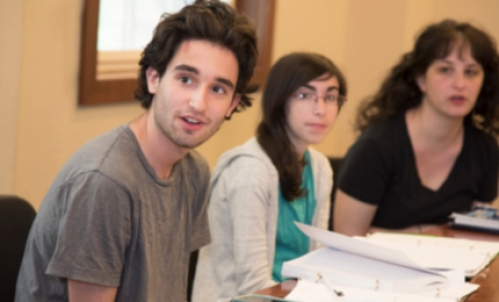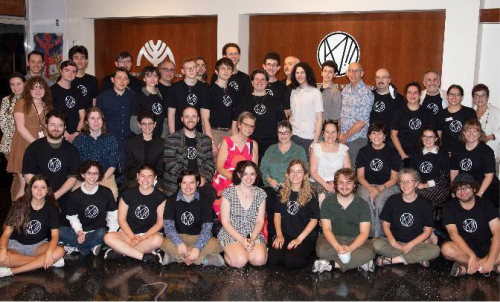Jews and Words: A Celebration of Jewish Writing, Language, and Expression
Co-presented with the Posen Foundation
Watch the video:
Jews and Words: A Celebration of Jewish Writing, Language, and Expression was a day-long conference to mark the publication of the inaugural volume of the Posen Library of Jewish Culture and Civilization and its companion book, Jews and Words by Amos Oz and Fania Oz-Salzberger. In four sessions, panelists explored issues that emerged in the pages of these books.
Schedule
9:30am
Registration
10:00am
Introduction
10:30am-11:45am
What We Talk About When We Talk About Jewish Culture
James Young (moderator), Deborah Dash Moore, Adam Kirsch, Liel Leibovitz
What is Jewish culture? What makes Jewish culture Jewish? These are among the central questions raised by the Posen Library, the largest anthological project ever undertaken by Jewish Studies scholars. In this conversation, two Posen Library editors and two journalists discuss how we define and classify, create boundaries and borders, and why those definitions are—or aren't—necessary.
11:45am-1:00pm
Was Irving Howe Right? The Rising (and Falling) Fortunes of Jewish Secularism
Jacques Berlinerblau (moderator), Samuel G. Freedman, Alana Newhouse, Jonathan Sarna
Secular Judaism was once closely connected to a Jewish language (Yiddish) and culture (Yiddishkeit). Without these, the critic Irving Howe once claimed, Jewish secularism would be cut from its roots, and would wither and disappear.
Has Howe's prediction been borne out? Or has secular Jewishness experienced a revival over the past decade, as Jonathan Sarna, one of the panelists in this session, once claimed?
1:00pm-2:00pm
Lunch Break (Lunch will not be provided.)
2:00pm-3:15pm
Talking Jewish: A Conversation
Dara Horn and David Roskies
From Deuteronomy to Portnoy's Complaint, the monologue genre has been a hallmark of Jewish writing—and on occasion, stylized Jewish speech has served as a stand-in for Jewish civilization as a whole. Is this phenomenon of "Jewspeak" a longstanding and constant feature of Jewish culture, or is it simply a symptom that appears in cultures in transition? Join literary scholar David Roskies and novelist Dara Horn for a conversation about the role that monologue has played in Jewish literature, and the choices writers and readers make in shifting cultural landscapes.
3:15pm-3:45pm
Coffee Break
3:45pm-5:00pm
Renewing Our Diasporas: Incorporating the European Past into Twenty-First Century Jewish Cultures
Jonathan Brent (moderator), Rokhl Kafrissen, Barbara Mann, Antony Polonsky
We have talked about establishing a canon through anthologizing. We've talked about great talkers in the past. We've explored the clash of religious and secular culture. Bu how, without just memorializing and without just looking back, are Jewish communities incorporating models from our history into our present? Our panelists will discuss their work in East European archives and museums, in urban space and the art world, and in a new environment in which the Yiddish language aims to thrive.
5:00pm
Reception
About the Participants
Jacques Berlinerblau is Associate Professor and Director of Jewish Civilization in the Edmund A. Walsh School of Foreign Service at Georgetown University. He specializes in secularism, secular Judaism, politics and religion, and Jewish American literature. He has published five books, his most recent being How to Be Secular: A Call to Arms for Religious Freedom (2012). He also produces and occasionally hosts the webcast “Faith Complex.” A native New Yorker, he now lives in Washington, DC with his family.
Jonathan Brent is the Executive Director of the YIVO Institute for Jewish Research in New York City. From 1991 to 2009 he was Editorial Director and Associate Director of Yale Press. He is the founder of the world acclaimed Annals of Communism series, which he established at Yale Press in 1991. Brent is the co-author of Stalin’s Last Crime: The Plot Against the Jewish Doctors, 1948-1953 (Harper-Collins, 2003) and Inside the Stalin Archives (Atlas Books, 2008). He is now working on a biography of the Soviet-Jewish writer Isaac Babel. Brent teaches history and literature at Bard College.
Deborah Dash Moore, co-editor of Volume 10 of the Posen Library of Jewish Culture and Civilization, is the Frederick C. L. Huetwell Professor of History at the University of Michigan, where she also directs the Jean and Samuel Frankel Center for Judaic Studies. Her books include GI Jews: How World War II Changed a Generation (2004) and the edited works American Jewish Identity Politics (2008), Gender and Jewish History (2010), and City of Promises: A History of the Jews in New York (2012).
Samuel G. Freedman is an award-winning author, columnist for The New York Times (for which he writes the column “On Religion”), and professor at the Columbia University Graduate School of Journalism. He is the author of Jew vs. Jew: The Struggle for the Soul of American Jewry (2000) and the forthcoming Breaking The Line: The Season in Black College Football That Transformed the Game and Changed the Course of Civil Rights.
Dara Horn was born in New Jersey in 1977 and received her Ph.D. in comparative literature from Harvard University in 2006. Her first novel, In the Image, published when she was 25, received a 2003 National Jewish Book Award. Her other works include The World to Come (2006), and All Other Nights (2009), The Rescuer (2012), and the forthcoming A Guide for the Perplexed.
Rokhl Kafrissen is a journalist and practicing attorney in New York City. She grew up in a secular, non-Yiddish speaking, deeply Jewish home on Long Island and studied Yiddish as an undergraduate at Brandeis University. In addition to her job at a large corporate law firm, Rokhl is working on her first book, The Myth of the Yiddish Atlantis: Dynamic Yiddishkayt for the New Millenium.
Adam Kirsch is a poet and literary critic. A senior editor at The New Republic and a columnist for Tablet, he is the author of two collections of poems and several books of criticism, including most recently Why Trilling Matters (2011).
Liel Leibovitz is a senior writer for Tablet Magazine and the author or co-author of five books, including The Chosen Peoples: America, Israel, and the Ordeals of Divine Election (with Todd Gitlin; 2010) and the upcoming A Broken Hallelujah: Leonard Cohen in the World. He is also an assistant professor of communications at New York University researching video games and digital media.
Barbara Mann is Associate Professor of Jewish Literature and serves as the Simon H. Fabian Chair in Hebrew Literature at the Jewish Theological Seminary. Her areas of expertise include Israeli and Jewish literature, cultural studies, modern poetry, urban studies, literary modernism, and the fine arts. She is the author of A Place in History: Modernism, Tel Aviv and the Creation of Jewish Urban Space (2005) and Space and Place in Jewish Studies (2012). Mann is also co-editor-in-chief of Prooftexts: A Journal of Jewish Literary History.
Alana Newhouse is the founder and editor-in-chief of Tablet Magazine, founded in 2009. Before that, she spent five years as culture editor of the Forward, where she supervised coverage of books, films, dance, music, art, and ideas. She also started a line of Forward-branded books with W.W. Norton and edited its first publication, A Living Lens: Photographs of Jewish Life from the Pages of the Forward (2007). A graduate of Barnard College and Columbia's Graduate School of Journalism, Alana has contributed to The New York Times, The Washington Post, The Boston Globe, and Slate.
Antony Polonsky holds the Walter Stern Hilborn Chair in Judaic and Social Studies at Brandeis University. In 1999, he was appointed Albert Abramson Professor of Holocaust Studies, held jointly at the United States Holocaust Memorial Museum and Brandeis University. The author and editor of numerous books, including ‘My Brother’s Keeper?’ Recent Polish Debates about the Holocaust (1990) and (with Joanna Michlic), The Neighbors Respond: The Controversy over the Jedwabne Massacre in Poland (2004). He is also editor of the annual Polin: Studies in Polish Jewry. His most recent work is the three-volume The Jews in Poland and Russia (2010, 2012), which was awarded the Pro historia Polonorum prize by the Senate of the Republic of Poland for the best book on Polish history in a foreign language published in the last five years.
David G. Roskies holds the Sol and Evelyn Henkind Chair in Yiddish Literature and Culture at the Jewish Theological Seminary. He is also the Naomi Prawer Kadar Visiting Professor in Yiddish Studies at the Hebrew University in Jerusalem. In 2012, Professor Roskies was elected to the American Academy of Arts and Sciences. His most recent books are Yiddishlands: A Memoir (2008), which has been translated into Hebrew and Russian, and Holocaust Literature: A History and Guide (2012), co-authored with Naomi Diamant.
Jonathan D. Sarna is the Joseph H. and Belle R. Braun Professor of American Jewish History at Brandeis University, and chairs its Hornstein Jewish Professional Leadership Program. He also chairs the Academic Advisory and Editorial Board of the Jacob Rader Marcus Center of the American Jewish Archives in Cincinnati, serves as Chief Historian of the National Museum of American Jewish History in Philadelphia, and is a columnist for the Forward. The author or editor of more than thirty books on American Jewish history and life, his American Judaism: A History (2004) won the Everett Jewish Book of the Year Award from the Jewish Book Council. His When General Grant Expelled the Jews was published in 2012.
James E. Young is editor-in-chief of the Posen Library of Jewish Culture and Civilization and Professor of English and Judaic Studies at the University of Massachusetts Amherst. He is the author of Writing and Rewriting the Holocaust (1988), The Texture of Memory (1993), which won the National Jewish Book Award in 1994, and At Memory's Edge: After-images of the Holocaust in Contemporary Art and Architecture (2000). He is also currently completing an insider’s account of the World Trade Center Memorial process, entitled The Stages of Memory at Ground Zero: A Juror's Report on the World Trade Center Memorial Process.

